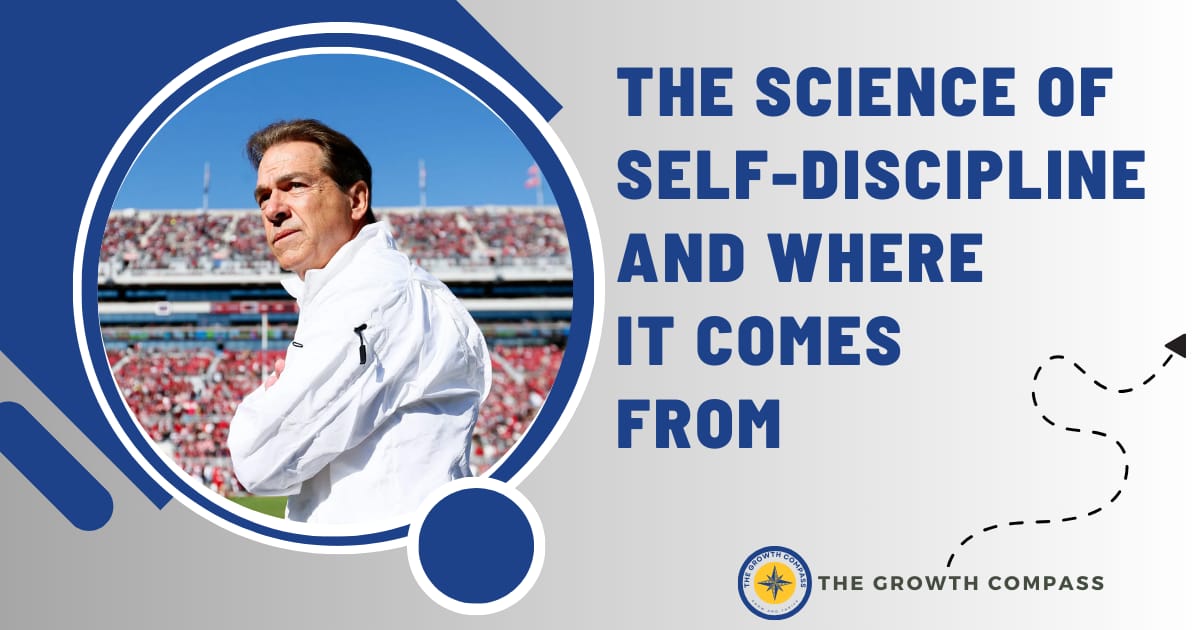
Good Day, and welcome to The Growth Compass!
⚠Reminder: We have given all subscribers access to our FREE Growth Compass Library that you can access HERE.

Here’s Where We Are Headed Today:
Ryan Holiday on Self-Discipline
Where Self-Discipline Comes From
Favorite Posts I Found This Week
Free Mental Fitness Links 👇
Ryan Holiday on Self-Discipline
“By being a little hard on ourselves, it makes it harder for others to be hard on us. By being strict with ourselves, we take away others’ power over us.”

Where Self-Discipline Comes From
What self-discipline is: Self-discipline is the ability to control your impulses, emotions, and actions to achieve your goals. It’s about making consistent choices that align with your values and priorities, even when it’s uncomfortable or challenging.
Why it matters: Self-discipline matters because it’s the foundation of personal success. Whether in fitness, career, or relationships, discipline allows you to stay committed to long-term goals, overcoming distractions and setbacks along the way.
So where does it come from? Self-discipline doesn’t come from external sources like your parents, upbringing, or environment - it comes from within. There are many people who build discipline while their parents didn’t, or parents who can’t instill it in their children. Discipline is a personal decision.
It’s a personal decision to take control of your actions and make choices that align with your desired outcomes. It comes from your own internal drive and commitment to growth. You can't rely on external forces to enforce discipline; it’s built through your own consistent efforts.

So what do the experts say about self-discipline?
Steven Bartlett, entrepreneur and host of The Diary of a CEO, offers a helpful equation to understand discipline:
❝Discipline =
Perceived Value of Goal
+ Reward of the Goal
- Costs of the Pursuit
Steven BartlettWe will get back to this equation, but it’s an interesting way to think about value, reward, and the price you are willing to pay especially in the moment.
Perceived Value of the Goal: This is how important and meaningful the goal is to you. The greater the perceived value, the more likely you are to stay disciplined.
Reward of the Goal: This represents the benefit or payoff you will receive when you achieve the goal, whether it’s tangible or emotional.
Costs of the Pursuit: These are the sacrifices or effort required to achieve the goal, such as time, energy, or comfort.
In Discipline is Destiny, Ryan Holiday argues that discipline is the key to mastering yourself and leading a fulfilling life. He emphasizes that without discipline, we become slaves to our impulses and distractions. Discipline isn’t just about external success; it’s about inner peace and self-mastery.
Nick Saban, the legendary football coach, defines self-discipline as doing what you need to do, when you need to do it, whether you feel like it or not. He believes that discipline is about maintaining focus on the task at hand, no matter how difficult or monotonous, in order to achieve greatness.
So what can we learn from this: Self-discipline is deeply rooted in how you view your goals, the rewards you associate with them, and your willingness to endure the costs of pursuing them. It means choosing the success of tomorrow versus the comfort of today. In the end, it comes down to making intentional choices that prioritize long-term growth over short-term pleasure or avoidance of discomfort.
How can I be better about my discipline? (Give me 3 takeaways)
Look at Steven Bartlett’s three inputs - Perceived Value, Reward, and Costs - and see how you can influence each one to build stronger discipline. It means clarify your goals, break down your goals into smaller steps, and commit to consistency.
How can you increase the perceived value of your goals? Is you why strong enough?
How can you keep the reward of achieving the goal in focus? How do you remind yourself?
How can you reduce the perceived costs of pursuit by breaking tasks down?
Start small and build momentum - When you achieve smaller goals, it creates a sense of accomplishment. This builds momentum and fuels your motivation to tackle bigger challenges. Over time, these small wins add up, making the path to larger goals feel more achievable.
Start with routines as you build - You become your habits. Establishing a structured routine eliminates decision-making and turns necessary actions into habits. It reduces the likelihood of procrastination or skipping because it removes the need for motivation, allowing you to operate on autopilot and focus your energy on execution.
Strengthen your willpower like any other muscle - Willpower is not fixed; it grows with intentional practice. Just like physical muscles, willpower gets stronger through repeated use and pushing past discomfort. Each time you exercise self-discipline, you increase your capacity for more, making future acts of discipline easier.
Favorite Posts I Found This Week
Free Mental Fitness Links 👇
That's a wrap for today. If you want to spread the joy, make sure to refer the newsletter to someone you think would benefit!
What'd you think of today's edition?
What I am reading and listening to:
Want More?
Feel free to view all of our FREE resources online here and our growing content library!
Interesting in advertising? Fill out this survey and we’ll get back to you soon!

